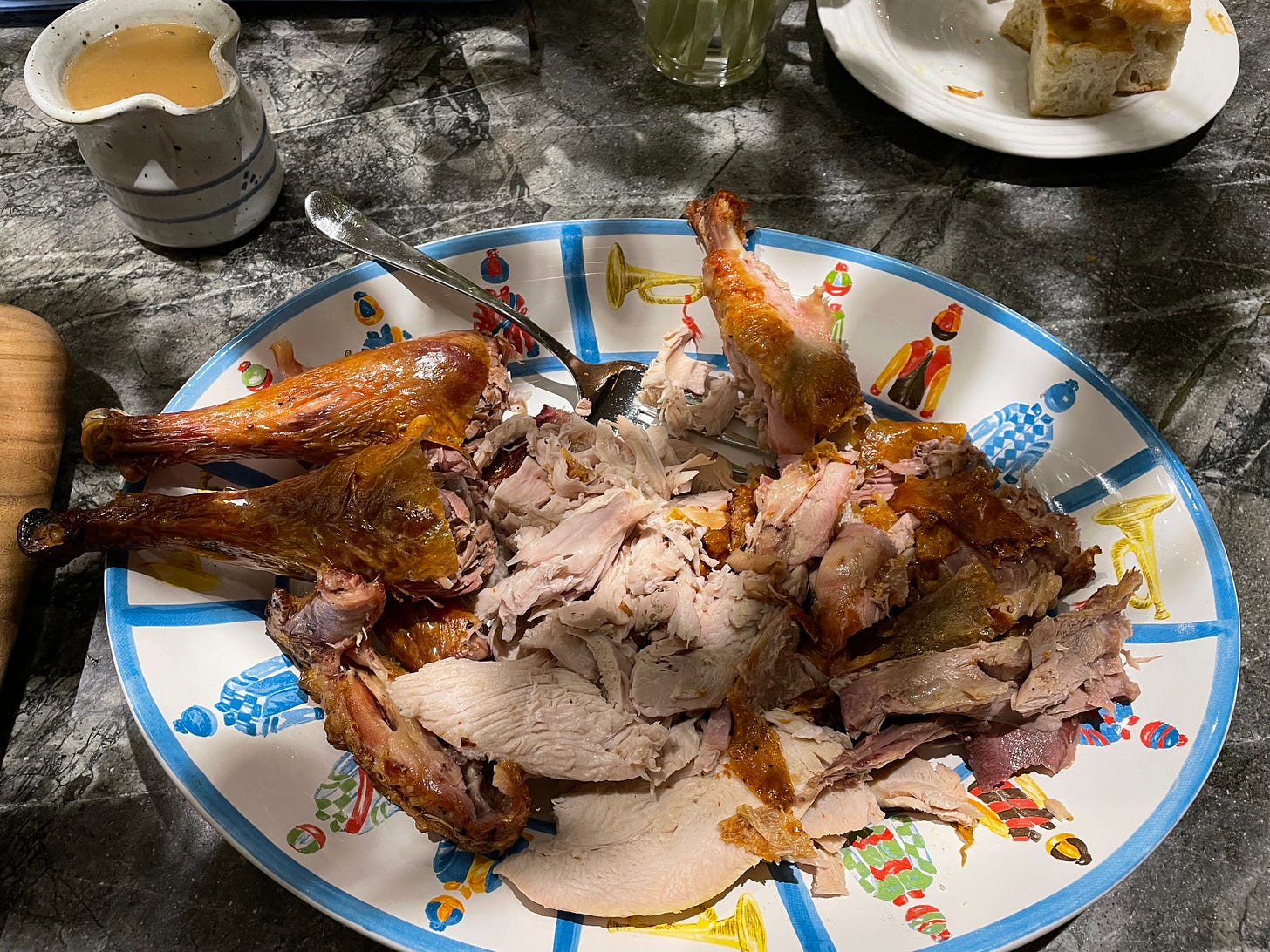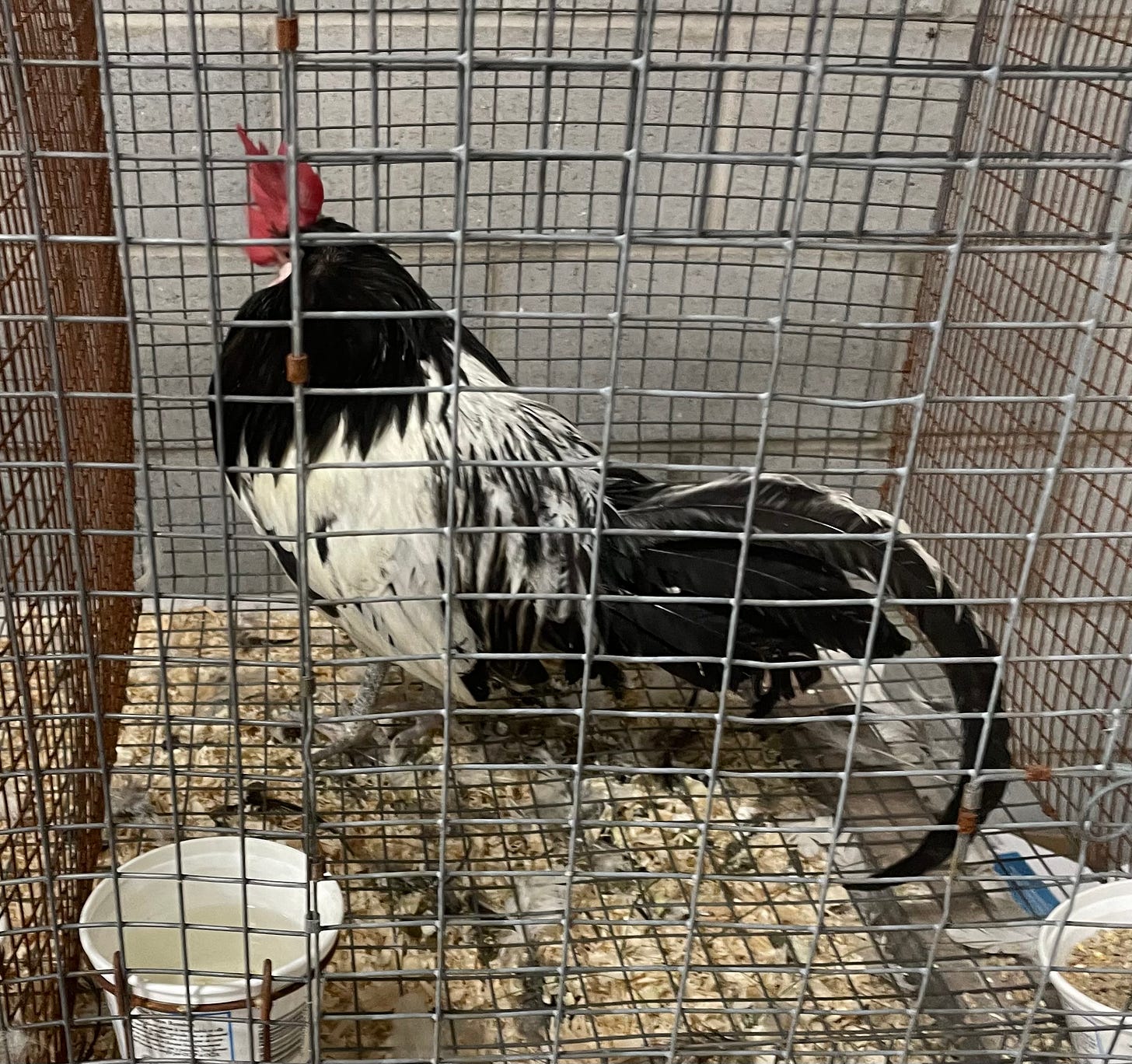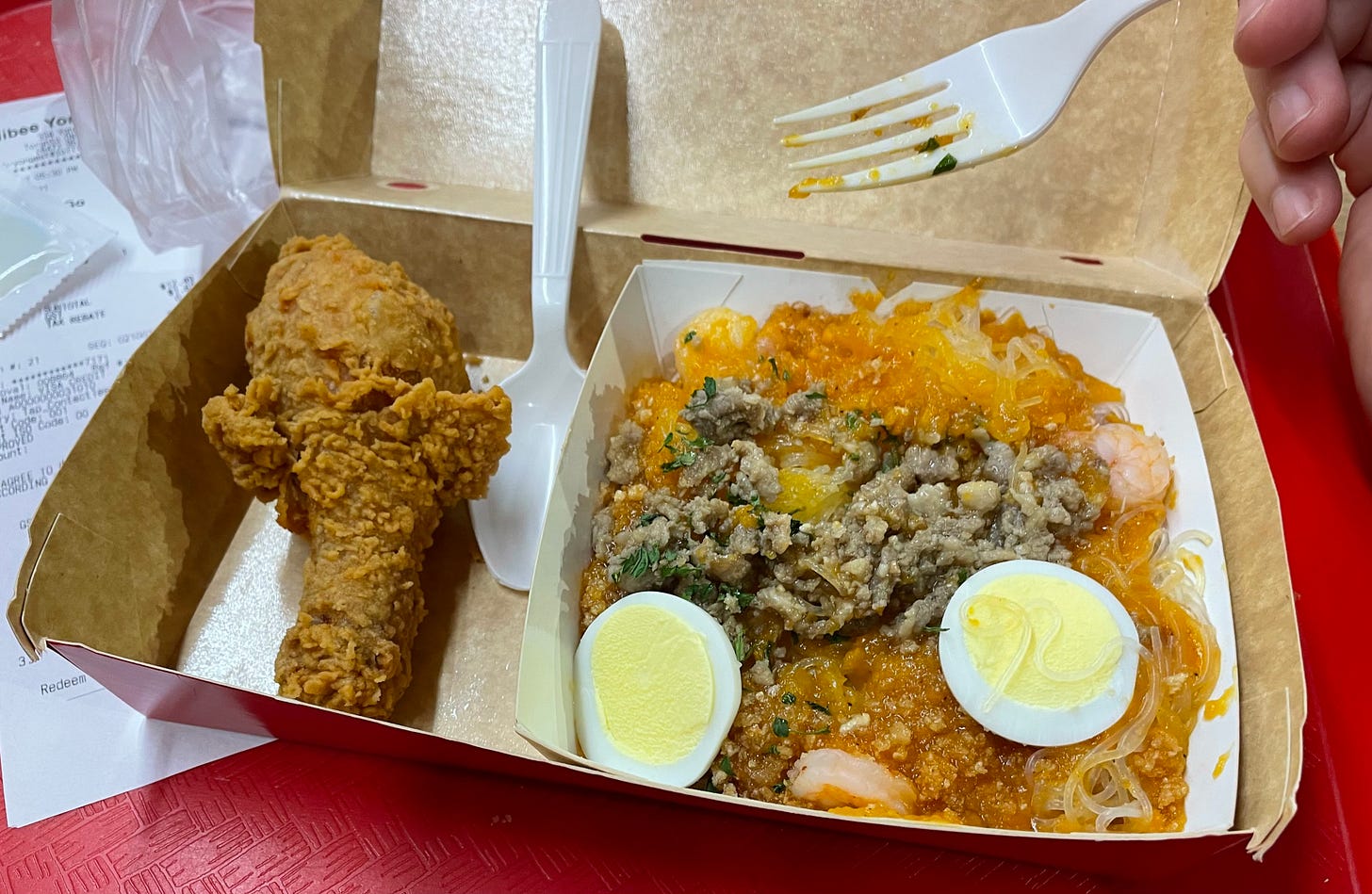Protein, fat, bone, and feather. The salty crackle of crispy skin. Warm umami. A sweet kiss of citrus. The lonely caw I hear, now and again, carried on the cold northern wind, from a homestead up the road. And time, can’t forget the time, ticking away fast or slow, sometimes all at once, as the knife thumps and the seasoning glistens.
There are nearly 22 billion chickens raised on poultry farms every year. At any given moment, that’s about three chickens for every person on the planet. No other livestock animal comes close. For a creature that seems so helpless, it has earned a special place at humanity’s table.
We raise them, eat them, keep them as pets. I’ve known farmers to spend thousands of dollars in wire and timber to keep their fowl safe from the hungry bite of a fox. One dedicated old spade bought a rare breed of dog from half the world over, and flew it on an airline jet, just to protect his investment.
The first meat I ever cooked was chicken. I was sixteen. Up until that day, my relationship to the protein was purely consumption. I never bothered to watch my mom roast, fry, or stew the bird, but I loved eating it. So I thought cooking chicken would be the easiest task in the world. My friend Mike and I brought our girlfriends over to my parent’s place. Our first girlfriends, our first couples dinner, my first attempt at chicken dinner. They were out of town, my parents, and we had the house to ourselves.
This was the house on Passmore, in a suburb on the eastern end of Orangeville, with the unfinished basement and vibrant red maple tree. My family had just moved from the 50-acre horse farm, so we’re talking about the period when dad was sick, but wasn’t yet in hospice care. We still thought the experimental chemotherapy and pills could drive the cancer into remission.
I drove to the grocery store in my rusty Jeep Cherokee and bought two packages of slightly slimy chicken breasts from the meat aisle. Free range, no skin. The label said Canadian Flash Frozen for Freshness. Sounded good to me! I walked around the store, basket in hand, feeling like someone twice my age. Confident, mature — a real man. I bought a bottle of Vodka Sauce because it sounded fancy, some garlic and spaghettini.
Cooking for four people… how hard could it be? Up until this point in my life, I had only fried grilled cheeses and boiled macaroni for KD. I quickly realized raw chicken was way, way out of my experience. At one point I wanted to give up. The expectation of the girls in the next room, their bellies grumbling, and the mess I had made on the cutting board. I had taken a few ingredients and began a ritual of sorts, chopping and frying and boiling, moving further and further from what I had hoped the meal would be and into a reality filled with disappointment.
Without knowing it, I had tapped into an ancient practice. We humans have a relationship with chicken. The flavour and smell and texture. We’ve been domesticating chickens since the Shang Dynasty, some four millennia ago. At the time, humans were just piecing together the first writing systems, such as hieroglyphics and cuneiform. But you better believe we could choose breeding pairs ideal for egg laying, fighting, meat, or sturdiness for travel.
There are thousands of chicken recipes, and many of them are variations on a meal that our ancestors prepared days before the fall of Alexandria or the sacking of Troy. When I ask myself, “How am I cooking the chicken today?” I’m asking a question that humans have pondered just as long, if not longer, than the material evidence of Christ.
This is to say, when I ask myself how I plan to cook chicken, I’m unconsciously asking a more important question than I realize. It’s not simply about the meal before me; it’s also a practical meditation on how I plan to spend my time. The effort I aim to invest in the meal, or the lack of effort, speaks to who I am and who I want to be.
As a sixteen-year-old boy, I had no idea what I was doing. I desperately needed an extra pair of hands and at least another hour to get it on the plate. What I served my guests tasted dry and tacky.
But the experience left an impression, and for the first time in my life, I began to pay attention to whatever the fuck my mom was doing in the kitchen.
The best way to convey my mom’s cooking style is to tell a story that my aunt Helen told me. When my parents first started dating, in the summer of ’79, long before I was in the picture, my mom decided to come over to my aunt’s place in Brampton and cook dinner.
This was no simple feat. My dad had three sisters, all of them older than him, and when they sat together at a table, they were notoriously witchy. The sisters did not like my mom. No one was ever good enough for their Davey. But especially mom, because she was fun to be around and shirked at the seriousness the sisters cultivated.
My mom arrives at the house and throws two raw whole chickens on the table. She proceeds to mingle, laugh, drink wine, and although no one ever recalls her being in the kitchen to prepare and the meal, what ended up on the table was the best bird they had ever tasted. Soft, juicy meat that melted on the tongue. Perfectly seasoned and paired with a gravy that weakened the knees. By dessert, my dad was beaming, and his sisters, for once in his life, had not one single remonstration.
After my first run-in with chicken, I tried my best to ask questions when mom prepped dinner. But the answers often confounded me.
How do you know when a roast chicken is ready?
“When it smells savoury and the skin has popped and the wing tips are extra crispy.”
What’s the best wine to use for a white sauce?
“Whatever is left over from the night before.”
If you want to know a person, really know them, watch them cook chicken. Do they read the recipe once or do they follow it meticulously? Do they refuse to wash as they go? Do they balk at the idea altogether and just order out?
The more I paid attention, the more I got to know my mom. Her courage and passion for life. I’ve never seen mom read a recipe or rely on a meat thermometer. Sometimes it hardly felt like cooking at all. Her instincts were attuned such that it seemed a divine hand worked alongside her. But at other times, things manifested differently.
I’ll tell another story.
Less than a year after my first run-in with chicken dinner, the last winter my dad was alive, he rented a room on a horse farm in South Carolina. I can’t remember how he met the owners. The wife’s name was Pam, and the husband was a retired executive from a Hollywood movie studio. It feels absurd writing this, but dad had a handful of horses on this farm and trained them, mostly alone and with a little help from Pam.
We’d hear stories on the phone with Pam about dad falling over on his way to the barn or not waking up until noon. That he was a little thin. So near the end of winter, mom, Kelly, and I drove down to see him. He looked awful. I had a hard time understanding him, especially at night, when the pain medication kicked in. We helped with the horses and stayed in a house nearby. On the last night of our trip, mom cooked lemon herb chicken. I’ve had this recipe of hers a hundred times. It was one of dad’s favourites.
But that night, after the meal, dad said, “That’s got to be the driest chicken breast I’ve ever eaten. It was like a hockey puck.”
I saw mom’s body language change. Her shoulders fell forward as if a knife just pierced her heart. The smile she wore, bravely and with great effort, for most of the night vanished. Our hosts laughed it off, but I felt the bite of my dad’s words from across the table.
To be fair, the lemon chicken was surprisingly dry. Maybe she drank too much — who could blame her? Dad was barely there; he sounded so tired and no one could find a way to tell him to stop. Please just stop and rest for once in your life. In my memory, with its strange avenues and connections, that meal was dad’s last. He drove back home a few days after us, and we must have had other meals together, but that’s the last one I remember.
In recent years, I’ve put a lot of attention on my dad’s passing, trying to unravel a period of my life I’ve kept buried. The when and how and especially the why. But on that night in South Carolina, I feel for my mom most of all. Her natural gift for cooking failed her. It may seem like a little thing, trivial or inconsequential, but that dry chicken breast ushered in a new chapter in our family’s life. When we arrived back home, everything was different. And I’m so sorry she had to be the one to carry that burden.
Cooking is not for the faint of heart. It can go wrong. Recipes lay out the steps to a great meal, but lots isn’t written on the card. Who is at the table or how I’m feeling or what awaits tomorrow. All anyone can do is make the effort, time and time again, to create a meal that brings joy and sustenance. A moment of peace in a world of chaos. If I keep that intention in mind with chicken, maybe it can rub off onto other ways I spend my time. With my daughter, my wife, myself. Do what I can with what I have. It’s what makes us who we are.
As I write this One Word, it’s late December. The new year approaches fast, just on the other side of the horizon now, bright and splendid and ripe with potential. I think I’ll end this by taking the time to write out how I’ve been cooking chicken for my family. It’s a fast and simple recipe, with a few tricky bits. I’m a lot like mom — I don’t follow recipes very well, and sometimes that works out, but not always. The best I can do is try.
Spatchcock Chicken, Seasoned
Time: About an hour
Servings: ~6
Ingredients
1 whole chicken
1/4 cup olive oil
2-3 tbsp salt
3 tbsp paprika
3 tbsp garlic powder
1. Wash the chicken in the sink with cold water. Pat dry with paper towel. Pay extra attention to the cavity and the breasts.
2. Time for the fun part — cutting out the chicken back, or spine. Place chicken ass-end up on the cutting board. Use poultry shears, if you have them, and cut alongside the rump on both sides, down towards the front of the bird. I don’t have shears. Instead, I use a sharp chef’s knife. If the wishbone gives you trouble, try breaking it with a meat cleaver.
3. Now that the spine is out of the bird, lay the meat flat and press on the breastplate to flatten it. Sometimes, you’ll hear the bone crack, but not always.
4. Using a pointy knife, make a few incisions between the skin and the breast meat. I do this from both the front and back of the bird. Then, use your fingers to separate the membrane. Be careful not to poke through the skin. Once completed, you should be able to move your fingers under the skin of the breasts.
5. Take a brush, or use your fingers, and massage some olive oil into the meat. Do the same thing with pinches of salt.
6. Brush olive oil on the surface of the bird, including breasts and legs. Rub salt on the surface, too. Enough that it feels like the entire bird has a thin layer of seasoning. It’s at this point that you can, if you have time, place the bird in the fridge to dry brine for up to 12 hours, or overnight.
7. When you’re ready to cook the bird, preheat your oven to 425F. Massage the paprika and garlic powder into the skin. It’ll clump on your fingers, but that’s okay. Make sure to season the bottoms of the thighs and legs, where they touch the cutting board.
8. Place the bird on a baking tray covered with tinfoil and cook for about 45 minutes. Cooking time depends on the size of the bird and your oven. Take it out when the breast read 165F and the legs read 180F on a meat thermometer. Or until it smells savoury and the skin has popped and the wing tips are extra crispy.








A journey, as every one of your posts is.
You write with raw vulnerability, which is a beautiful thing to do.
My wife's father suffers from severe Parkinson's and now dementia and is in a home. During his cognitive decline, there were similar moments of saying things that stung, both with my mother-in-law and also my wife. It's heart-breaking, especially when you know that such words are not coming from the person that used to be there.
I'm sorry for all you had to go through, Taegan. Thank you for sharing this with us, though.
On a lighter note: my relationship with cooking has blossomed over the years. I thoroughly enjoy the process now, whereas I gave it no thought as a child and sadly never watched my mum or dad cook to learn from them. But now I find it almost meditative, provided that all ingredients are bought and I know what I'm cooking. I'm also somewhat OCD when it comes to cleaning up as I go. Things take me two or three times as long as they should because I'm constantly cleaning up after myself.
My wife... not so much 🤣 if I leave her alone and I come back into the kitchen, it always amazes me just how much mess one can create in such a short span of time, haha. (But of course, it is one of the many little things that endear me to her even more.)
Well done on every level. I might even try the recipe, though I'm pretty committed to the one way I cook chicken.